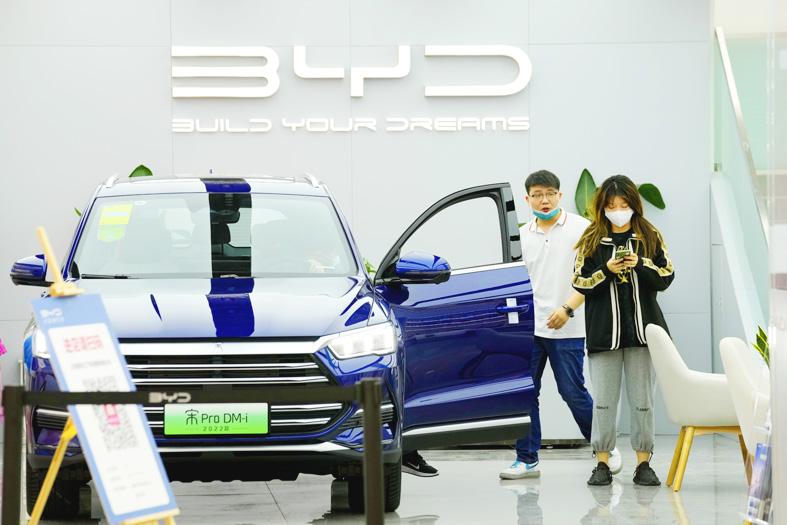Runaway raw material costs are fueling a “ridiculous” increase in the price of batteries for electric vehicles (EV), said Li Auto Inc (理想汽車) chief executive Li Xiang (李想), who took to social media in China late on Saturday to offer a rare insight into EV makers’ pain.
“The cost of batteries in the second quarter rose by a very ridiculous amount,” Li said on his official Sina Weibo (微博) account.
EV makers that have not raised prices yet are probably going to have to once their battery suppliers start charging more, he added.

Photo: AP
Li’s comments came after automakers in China from Tesla Inc to BYD Co (比亞迪) increased the prices of their vehicles.
Xpeng Inc (小鵬汽車) also hiked costs last week, saying in a note to customers that it would increase the price of its EVs by between 10,100 yuan and 20,000 yuan (US$1,587 and US$3,143).
Automakers in China, the world’s biggest EV market, are trying to lure more customers just as government subsidies for cleaner vehicles fall away. Combustion engine cars, still made by the likes of BYD and Geely Automobile Holdings Ltd (吉利汽車), are also facing higher running costs due to soaring oil prices.
Contemporary Amperex Technology Co Ltd (CATL, 新能源科技), the world’s largest battery maker, has noted the higher commodity costs, saying they are putting pressure on cell and automakers alike.
“The surge of upstream raw materials has caused certain pressure on downstream segments of the industry chain, including carmakers and battery makers,” a CATL spokesman said. “We adhere to the principle of providing customers with high-quality products while maintaining a reasonable level of profit.”
Smaller EV maker WM Motor Technology Co (威馬汽車) also cited raw materials prices and supplier constraints for its increases of between 7,000 yuan and 26,000 yuan after subsidies, according to a Sina Weibo post last week. Those hikes start on March 28.
Li Auto gets its batteries from CATL, as does WM Motor, among other suppliers, according to Bloomberg Intelligence.
Meanwhile, the Chinese government is telling its EV battery supply chain that it wants lithium prices to return to sustainable levels.
The government last week called in a range of market participants — from lithium producers to the main automakers’ association — to discuss “a rational return” for lithium prices, a statement from the Chinese Ministry of Industry and Information Technology said late on Friday.
Lithium has soared nearly 500 percent in the past year, adding to cost pressures for EV producers.
The seminar on Wednesday and Thursday last week was aimed at discussing surging costs and promoting what the ministry called the healthy development of the new-energy vehicle and battery sectors. It also addressed supply bottlenecks, how lithium is priced, as well as measures to steady prices and secure supply.

TECH CLUSTER: The US company’s new office is in the Shalun Smart Green Energy Science City, a new AI industry base and cybersecurity hub in southern Taiwan US chip designer Advanced Micro Devices Inc (AMD) yesterday launched an office in Tainan’s Gueiren District (歸仁), marking a significant milestone in the development of southern Taiwan’s artificial intelligence (AI) industry, the Tainan City Government said in a statement. AMD Taiwan general manager Vincent Chern (陳民皓) presided over the opening ceremony for the company’s new office at the Shalun Smart Green Energy Science City (沙崙智慧綠能科學城), a new AI industry base and cybersecurity hub in southern Taiwan. Facilities in the new office include an information processing center, and a research and development (R&D) center, the Tainan Economic Development Bureau said. The Ministry

ADVERSARIES: The new list includes 11 entities in China and one in Taiwan, which is a local branch of Chinese cloud computing firm Inspur Group The US added dozens of entities to a trade blacklist on Tuesday, the US Department of Commerce said, in part to disrupt Beijing’s artificial intelligence (AI) and advanced computing capabilities. The action affects 80 entities from countries including China, the United Arab Emirates and Iran, with the commerce department citing their “activities contrary to US national security and foreign policy.” Those added to the “entity list” are restricted from obtaining US items and technologies without government authorization. “We will not allow adversaries to exploit American technology to bolster their own militaries and threaten American lives,” US Secretary of Commerce Howard Lutnick said. The entities

Minister of Finance Chuang Tsui-yun (莊翠雲) yesterday told lawmakers that she “would not speculate,” but a “response plan” has been prepared in case Taiwan is targeted by US President Donald Trump’s reciprocal tariffs, which are to be announced on Wednesday next week. The Trump administration, including US Secretary of the Treasury Scott Bessent, has said that much of the proposed reciprocal tariffs would focus on the 15 countries that have the highest trade surpluses with the US. Bessent has referred to those countries as the “dirty 15,” but has not named them. Last year, Taiwan’s US$73.9 billion trade surplus with the US

The Taipei International Cycle Show (Taipei Cycle) yesterday opened at the Taipei Nangang Exhibition Center, with the event’s organizer expecting a steady recovery in the industry this year following a tough last year. This year, 980 companies from 35 countries are participating in the annual bicycle trade show, showcasing technological breakthroughs and market development trends of the bicycle industry at 3,600 booths, the Taiwan External Trade Development Council (TAITRA, 外貿協會) said in a statement. Under the theme “Ride the Revolution,” the exhibition has attracted more than 3,500 international buyers from 80 countries to preregister for the four-day event, which is expected to